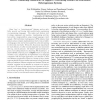Free Online Productivity Tools
i2Speak
i2Symbol
i2OCR
iTex2Img
iWeb2Print
iWeb2Shot
i2Type
iPdf2Split
iPdf2Merge
i2Bopomofo
i2Arabic
i2Style
i2Image
i2PDF
iLatex2Rtf
Sci2ools
110
click to vote
ICSE
2003
IEEE-ACM
2003
IEEE-ACM
DADO: Enhancing Middleware to Support Crosscutting Features in Distributed, Heterogeneous Systems
Some "non-' or "extra-functional" features, such as reliability, security, and tracing, defy modularization mechanisms in programming languages. This makes such features hard to design, implement, and maintain. Implementing such features within a single platform, using a single language, is hard enough. With distributed, heterogeneous (DH) systems, these features induce complex implementations which cross-cut different languages, OSs, and hardware platforms, while still needing to share data and events. Worse still, the precise requirements for such features are often locality-dependent and discovered late (e.g., security policies). The DADO1 approach helps program cross-cutting features by improving DH middleware. A DADO service comprises pairs of adaplets which are explicitly modeled in IDL. Adaplets may be implemented in any language compatible with the target application, and attached to stubs and skeletons of application objects in a variety of ways. DADO supp...
Related Content
| Added | 09 Dec 2009 |
| Updated | 09 Dec 2009 |
| Type | Conference |
| Year | 2003 |
| Where | ICSE |
| Authors | Eric Wohlstadter, Stoney Jackson, Premkumar T. Devanbu |
Comments (0)

